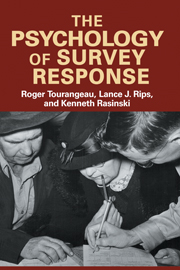Book contents
- Frontmatter
- Contents
- Preface
- 1 An Introduction and a Point of View
- 2 Respondents' Understanding of Survey Questions
- 3 The Role of Memory in Survey Responding
- 4 Answering Questions about Dates and Durations
- 5 Factual Judgments and Numerical Estimates
- 6 Attitude Questions
- 7 Attitude Judgments and Context Effects
- 8 Selecting a Response: Mapping Judgments to Survey Answers
- 9 Editing of Responses: Reporting about Sensitive Topics
- 10 Mode of Data Collection
- 11 Impact of Cognitive Models on Survey Measurement
- References
- Author Index
- Subject Index
9 - Editing of Responses: Reporting about Sensitive Topics
Published online by Cambridge University Press: 05 June 2012
- Frontmatter
- Contents
- Preface
- 1 An Introduction and a Point of View
- 2 Respondents' Understanding of Survey Questions
- 3 The Role of Memory in Survey Responding
- 4 Answering Questions about Dates and Durations
- 5 Factual Judgments and Numerical Estimates
- 6 Attitude Questions
- 7 Attitude Judgments and Context Effects
- 8 Selecting a Response: Mapping Judgments to Survey Answers
- 9 Editing of Responses: Reporting about Sensitive Topics
- 10 Mode of Data Collection
- 11 Impact of Cognitive Models on Survey Measurement
- References
- Author Index
- Subject Index
Summary
National surveys generally steer clear of questions that might offend respondents, keeping to relatively impersonal factual questions or items about abstract attitude issues. But almost every survey includes some items that are likely to seem intrusive or too personal to some respondents. For instance, it is quite common for surveys to ask the respondents about their income. Here's a representative income question, taken from the CPS:
(Including overtime pay, tips and commissions,) what are (name's/your) usual monthly earnings on (this job/(your/his/her) MAIN job), before taxes or other deductions? [CPS]
Many surveys try to soften the blow a bit by letting respondents choose from broad income groupings, but the CPS item asks for an exact dollar amount. The census Long Form – sent to one-sixth of the U.S. population – also includes detailed income questions about multiple sources of income (salaries, royalties, Social Security payments, and so on) that seek exact dollar amounts for every adult member of the household.
Even when a survey doesn't ask about the respondent's income, it almost certainly includes other standard demographic questions, and it isn't hard to imagine circumstances in which questions about age, say, or marital status might provoke embarrassment. In addition, surveys often begin by asking respondents for a roster of household members.
Information
- Type
- Chapter
- Information
- The Psychology of Survey Response , pp. 255 - 288Publisher: Cambridge University PressPrint publication year: 2000
Accessibility standard: Unknown
Why this information is here
This section outlines the accessibility features of this content - including support for screen readers, full keyboard navigation and high-contrast display options. This may not be relevant for you.Accessibility Information
- 5
- Cited by
